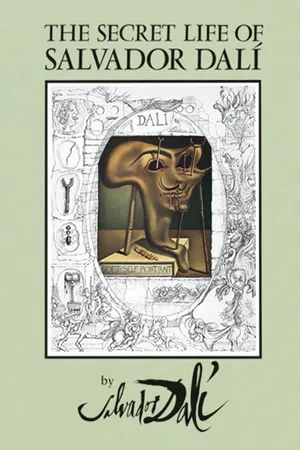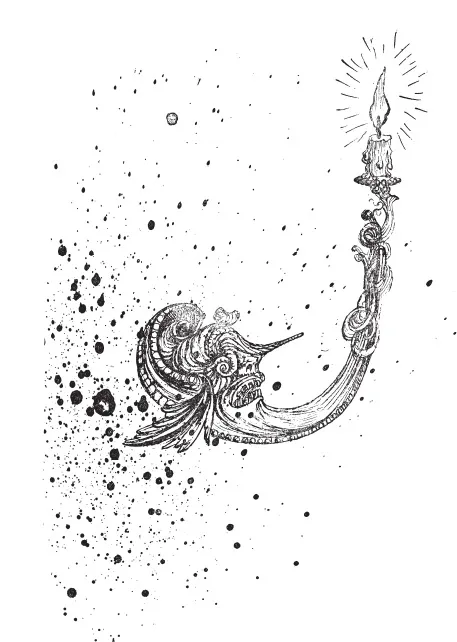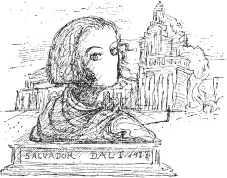![]()
PART I
![]()
CHAPTER ONE
Anecdotic Selfportrait
I know what I eat
I do not know what I do
Fortunately I am not one of those beings who when they smile are apt to expose remnants, however small, of horrible and degrading spinach clinging to their teeth. This is not because I brush my teeth better than others; it is due to the much more categorical fact that I do not eat spinach. It so happens that I attach to spinach, as to everything more or less directly pertaining to food, essential values of a moral and esthetic order. And of course the sentinel of disgust is ever on hand, vigilant and full of severe solicitude, ceremoniously attentive to the exacting choice of my foods.
I like to eat only things with well-defined shapes that the intelligence can grasp. I detest spinach because of its utterly amorphous character, so much so that I am firmly convinced, and do not hesitate for a moment to maintain, that the only good, noble and edible thing to be found in that sordid nourishment is the sand.
The very opposite of spinach is armor. That is why I like to eat armor so much, and especially the small varieties, namely, all shell-fish. By virtue of their armor, which is what their exoskeleton actually is, these are a material realization of the highly original and intelligent idea of wearing one’s bones outside rather than inside, as is the usual practice.
The crustacean is thus able, with the weapons of its anatomy, to protect the soft and nutritive delirium of its insides, sheltered against all profanation, enclosed as in a tight and solemn vessel which leaves it vulnerable only to the highest form of imperial conquest in the noble war of decortication: that of the palate. How wonderful to crunch a bird’s tiny skull!1 How can one eat brains any other way! Small birds are very much like small shell-fish. They wear their armor, so to speak, flush with their skin. In any case Paolo Uccello painted armor that looked like little ortolans and he did this with a grace and mystery worthy of the true bird that he was and for which he was named.
I have often said that the most philosophic organs man possesses are his jaws. What, indeed, is more philosophic than the moment when you slowly suck in the marrow of a bone that is being powerfully crushed in the final destructive embrace of your molars, entitling you to believe that you have undisputed control over the situation?–For it is at the supreme moment of reaching the marrow of anything that you discover the very taste of truth, that naked and tender truth emerging from the well of the bone which you hold fast between your teeth.
Having once overcome the obstacle by virtue of which all self-respecting food “preserves its form,” nothing can be regarded as too slimy, gelatinous, quivering, indeterminate or ignominious to be desired, whether it be the sublime viscosities of a fish-eye, the slithery cerebellum of a bird, the spermatozoal marrow of a bone or the soft and swampy opulence of an oyster.2 I shall undoubtedly be asked: In that case, do you like Camembert? Does it preserve its form? I will answer that I adore Camembert precisely because when it is ripe and beginning to run it resembles and assumes exactly the shape of my famous soft watches, and because being an artificial elaboration its original form, though honorable, is not one for which it is entirely responsible. Furthermore I would add that if one were to succeed in making Camembert in the shape of spinach I should very probably not like it either.
But do not forget this: a woodcock, properly high and over which a fine grade of brandy has been burned, served in its own excrement with all the ritual of the best restaurants of Paris, will always represent for me, in this grave domain of food, the most delicate symbol of an authentic civilization. And how beautiful a woodcock is to look upon as it lies naked in the dish! Its slender anatomy achieves, one might say, the proportions of Raphaelesque perfection.
Thus I know exactly, ferociously, what I want to eat! And I am all the more astonished to observe habitually around me creatures who will eat anything, with that sacrilegious lack of conviction that goes with the accomplishment of a strict necessity.
But while I have always known exactly and with premeditation what I wished to obtain of my senses, the same is not true of my sentiments, which are light and fragile as soap-bubbles. For, generally speaking, I have never been able to forsee the hysterical and preposterous course of my conduct, and even less the final outcome of my acts, of which I am often the first astonished spectator and which always acquire at their climax the heavy, categorical and catastrophic weight of leaden balls. It is as if each time one of these thousand iridescent bubbles of my sentiments strays from the course of its ephemeral life and miraculously reaches the earth–reaches reality–it is at that moment transformed into an important act, suddenly changed from something transparent and ethereal into something opaque, metallic and menacing as a bomb. Nothing can better illuminate this than the kinds of stories which are to follow, selected for this chapter without chronological order from the anecdotic stream of my life. When they are strictly authentic and bluntly told, as these are, such anecdotes offer their colors and contours with the guarantee of an unmistakable resemblance that is essential to any honest attempt at self-portraiture. They would have been, I know, secrets forever sealed for many. My fixed idea in this book is to kill as many of these secrets as possible, and to kill them with my own hands!
I
I was five years old, and it was springtime in the village of Cambrils, near Barcelona. I was walking in the country with a boy smaller than I, who had very blond curly hair, and whom I had known only a short time. I was on foot, and he was riding a tricycle. With my hand on his back I helped to push him along.
We got to a bridge under construction which had as yet no railings of any kind. Suddenly, as most of my ideas occur, I looked behind to make sure no one was watching us and gave the child a quick push off the bridge. He landed on some rocks fifteen feet below. I ran home to announce the news.
During the whole afternoon bloodstained basins were brought down from the room where the child, with a badly injured head, was going to have to remain in bed for a week. The continual coming and going and the general turmoil into which the house was thrown put me in a delightful hallucinatory mood. In the small parlor, on a rocking chair trimmed with crocheted lace that covered the back, the arms and the cushion of the seat, I sat eating cherries. The lace was adorned with plump plush cherries. The parlor looked out on the hall, so that I could observe everything that went on, and it was almost completely dark, for the shutters had been drawn to ward off the stifling heat. The sun beating down on them lit up knots in the wood, turning them to a fiery red like ears lighted from behind. I don’t recall having experienced the slightest feeling of guilt over this incident. That evening while taking my usual solitary walk I remember having savored the beauty of each blade of grass.
II
I was six years old. Our drawing-room was full of people. They were talking about a famous comet that would be visible that same evening if there were no clouds. Someone had said it was possible that its tail might touch the earth, in which case the world would come to an end. In spite of the irony registered on most of the faces I was seized with a growing agitation and fright. Suddenly one of my father’s office clerks appeared in the drawing-room doorway and announced that the comet could be seen from the terrace. Everyone ran up the stairs except myself; I remained sitting on the floor as if paralyzed with fear. Gathering a little courage I in turn got up and dashed madly toward the terrace. While crossing the hall I caught sight of my little three-year-old sister crawling unobtrusively through a doorway. I stopped, hesitated a second, then gave her a terrible kick in the head as though it had been a ball, and continued running, carried away with a “delirious joy” induced by this savage act. But my father, who was behind me, caught me and led me down into his office, where I remained for punishment till dinner time.
The fact of not having been allowed to see the comet has remained seared in my memory as one of the most intolerable frustrations of my life. I screamed with such rage that I completely lost my voice. Noticing how this frightened my parents, I learned to make use of the stratagem on the slightest provocation. On another occasion when I happened to choke on a fish-bone my father, who couldn’t stand such things, got up and left the dining room holding his head between his hands. Thereafter on several occasions I simulated the hacking and hysterical convulsions that accompany such choking just to observe my father’s reaction and to attract an anguished and exclusive attention to my person.
At about the same period, one afternoon, the doctor came to the house to pierce my sister’s earlobes. My feeling for her was one of delirious tenderness, which had only grown since the incident of my kicking her. This ear-piercing appeared to me an act of outrageous cruelty which I decided to prevent at all costs.
I waited for the moment when the doctor was already seated, had adjusted his glasses, and was ready to perform the operation. Then I broke into the room brandishing my leather-thonged mattress beater and whipped the doctor right across the face, breaking his glasses. He was quite an old man and he cried out with pain. When my father came running in he fell on his shoulder.
“I would never have thought he could do a thing like that, fond of him as I was!” he exclaimed in a voice finely modulated as a nightingale’s song, broken by sobs. Since then I loved to be sick, if only for the pleasure of seeing the little face of that old man whom I had reduced to tears.
III
Back to Cambrils again, and to my fifth year. I was taking a walk with three very beautiful grown women. One of them especially appeared to me miraculously beautiful. She held me by the hand and she was wearing a large hat with a white veil twisted round it and falling over her face, which made her extremely moving. We reached a deserted spot, whereupon they began to titter and to whisper among themselves in an ambiguous way. I became troubled and jealous when they began to insist on my running off somewhere to play by myself. I finally left them, but only in order to find a point of vantage from which to spy on them. Suddenly I saw them get into odd postures.
The most beautiful one was in the center, curiously observed from a distance of a few feet by the other two who had stopped talking. With a strange look of pride, her head slightly lowered, her legs very rigid and outspread, her hands by her hips delicately and imperceptibly raised her skirt, and her immobility seemed to convey the expectation of something that was about to happen. A stifling silence reigned for half a minute, when suddenly I heard the sound of a strong liquid jet striking the ground and immediately a foaming puddle formed between her feet. The liquid was partially absorbed by the parched earth, the rest spreading in the form of tiny snakes that multiplied so fast that her white-colored shoes did not escape them in spite of her attempts to extend her feet beyond their reach. A grayish stain of moisture rose and spread on the two shoes, on which the whiting acted as blotting paper.
Intent on what she was doing, the “woman with the veil” did not notice my paralyzed attention. But when she raised her head and found herself looking right into my face she tossed me a mocking smile and a look of unforgettable sweetness, which appeared infinitely troubling, seen through the purity of her veil. Almost at the same moment she cast a glance at her two friends with an expression that seemed to say: “I can’t stop now, it’s too late.” Behind me the two friends burst out laughing, and again there was silence. This time I immediately understood, and my heart beat violently. At almost the same moment two new streams struck hard against the ground; I did not turn my head away; my eyes were wide open, fixed on those behind the veil. A mortal shame welled into my face with the ebb and flow of my crazed blood, while in the sky the last purples of the setting sun melted into the twilight, and on the calcinated earth these three long-confined, hard and precious jets resounded like three drums beneath cascades of wild topazes in ebullition.
Night was falling as we started back, and I refused to give my hand to any of the three young women. I followed them at a short distance, my heart torn between pleasure and resentment. In my shut fist I was carrying a glow-worm which I had picked up by the roadside, and from time to time I gently half-opened my hand to watch it glow. I kept my hand so carefully contracted that it dripped with perspiration, and I would shift the glow-worm from one hand to the other to keep it from getting drenched. Several times in the course of these operations it fell out of my grasp, and I had to look for it in the white dust over which the faint moonlight cast a bluish tinge. And once as I stooped a drop of sweat fell from my hand, making a hole in the dust. The sight of this hole made me shiver. I felt myself tingling with goose flesh. I picked up my glow-worm and, seized with a sudden fright, ran toward the three young women who had left me far behind. They were waiting for me, and the one with the veil vainly held out her hand to me. I wouldn’t take it. I walked very close to her, but without giving her my hand.
When we had almost reached the house my twenty-year old cousin came out to meet us. He was carrying a small rifle slung across his shoulder and his other hand held up some object for us to see. Upon coming nearer we saw that it was a small bat that he held dangling by the ears and that he had just shot in the wing. When we got home he put it in a little tin pail and made me a present of it, when he saw that I was dying to have it. I ran back to the wash-house, which was my favorite spot. There I had a glass under which I kept some ladybugs, with green metallic gleams, on a bed of mint leaves. I put my glow-worm inside the glass, which I placed inside the pail, where the bat remained almost motionless. I spent an hour there before dinner deep in revery. I remember that I spoke aloud to my bat, which I suddenly adored more than anything in the world, and which I kissed again and again on the hairy top of its head.
The next morning a frightful spectacle awaited me. When I reached the back of the wash-house I found the glass over-turned, the ladybugs gone and the bat, though still half-alive, bristling with frenzied ants, its tortured little face exposing tiny teeth like an old woman’s Just then I caught sight...


